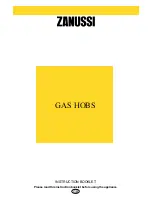
23
ENGLISH
GENERAL WARNINGS
DO NOT ABBANDON THE PACKAGING MATERIAL OR PARTS OF IT. THEY
MAY CREATE A SUFFOCATION DANGER FOR CHILDREN, ESPECIALLY
PLASTIC BAGS.
Even your old appliance must be disposed of properly, this will contribute to avoiding negative envi-
ronmental and health consequences, that would occur as a result of improper disposal.
IMPORTANT:
this appliance cannot be treated as household waste. Deliver the old
appliance to the local company that is authorised to collect appliances that are no
longer in use. A proper disposal makes an intelligent recovery of precious materials. It
is also necessary to cut the cable connecting to the power mains and remove it along
with the plug.
4. Know your appliance
All drawings relating to the Foster cooker hobs manufactured today, are at the end of this manual,
Gas
cooker hobs summary
[
Page 182
].
We ask that you recognise the drawing of the cooker hob you have purchased to familiarise with the
main technical-functional features.
For research practicality the cooker hobs are distinguished in two macro-families:
• Traditional built-in cooker hobs
: “8 mm edge”, “Q4 edge” and “semi-flush edge”;
• Flush built-in cooker hobs:
“flush-mount” edge.
Regardless of the type of edge,
the first group has a simple traditional built-in hole. The cooker
hobs with "flush-mount" edge have a more detailed drawing to enable realisation of the "made to
measure" hole, or having a step necessary to house the edge of the cooker hub so it is "flush" with
the worktop.
Numbers in correspondence with the burners are present in all drawings. Such numbers identify the
type of burner depending on the key below. To know the powers of the burners of the gas cooker hub
you purchased, refer to reading the powers table depending on the type of gas used
[
Page 182
].






































